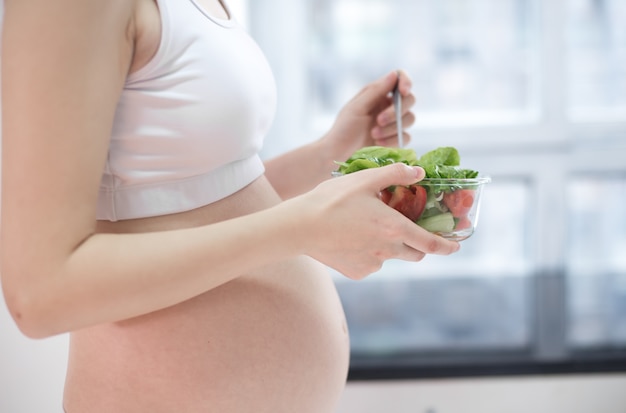
When you’re pregnant, every decision about what you eat becomes extra important because you’re also feeding your baby. It might feel tricky at times—especially with challenges like nausea, fatigue, and constipation—but maintaining a healthy diet is key for both you and your little one.
### Eating Right
Now that you’re “eating for two,” focusing on a balanced diet is essential. There are pregnancy-friendly vitamins and supplements available, but steer clear of anything containing vitamin A, as too much can be harmful to your baby. Be sure to check the labels of multivitamins. You can also get your nutrients naturally through food, so let’s break down the key nutrients and where to find them.
#### Nutrients to Include
During pregnancy and breastfeeding, you’ll need 10 micrograms of vitamin C daily and 400 micrograms of folic acid.
**Natural Sources of Folic Acid**:
– Leafy greens like spinach, broccoli, lettuce, and turnip greens.
– Fortified cereals.
– Peanuts (recent research shows no clear link between eating peanuts in pregnancy and allergies in your baby).
– Wheat germ.
– Sunflower seeds.
– Brown rice.
– Turkey.
– Certain fruits, including bananas, oranges, avocados, and cantaloupes.
Chicken liver is rich in folic acid, but it’s best avoided during pregnancy because liver products can have harmful amounts of vitamin A. To preserve nutrients during cooking, steaming is a great option. Foods with folic acid often also have vitamin C, such as leafy greens like spinach.
**Natural Sources of Vitamin C**:
– Fruits like oranges, kiwis, mangoes, pineapples, and strawberries.
– Vegetables like green peppers, broccoli, Brussels sprouts, and tomatoes.
– Leafy greens like turnip greens and spinach.
#### A Balanced Diet
Try to eat something from each of the main food groups every day:
1. Fruits and vegetables.
2. Starchy foods (like whole grains).
3. Protein-rich foods (meat, beans, fish).
4. Dairy products (milk, yogurt, cheese).
5. Foods high in sugar or fat (keep these to a small portion).
### Foods to Avoid
To protect your baby, you’ll need to skip certain foods entirely:
– **Foods that may contain listeria**: This harmful bacteria is found in pâtés (even veggie varieties), mold-ripened cheeses (like brie, camembert, and blue cheeses), cold meats, and smoked fish.
– **Liver and liver products**: These contain potentially harmful levels of vitamin A.
– **Certain fish**: Avoid shark, swordfish, and marlin due to high mercury levels.
– **Unpasteurized milk**: This includes soft goat’s cheese or any foods made from unpasteurized goat’s or sheep’s milk.
– **Homemade items**: Steer clear of mayonnaise and mousses that might use raw or undercooked eggs.
You can have pasteurized or UHT milk and products safely.
#### Foods to Limit
– **Tuna**: Stick to no more than 140 grams of cooked or canned tuna per week.
– **Caffeine**: Limit your intake to 200mg per day. That’s roughly two mugs of instant coffee, one cup of filter coffee, or two and a half cups of tea. Remember caffeine is also in chocolate and some sodas or energy drinks.
### Cooking and Food Prep Tips
– Cook meat thoroughly—there shouldn’t be any pink left.
– Shellfish should only be eaten if well-cooked.
– Ensure egg whites and yolks are solid.
– Wash fruits and veggies thoroughly to remove any dirt or contaminants.
Keep in mind that during pregnancy, you’ll need about 200-300 extra calories per day. Planning meals ahead of time can help you meet nutritional needs.
### Meal Ideas
For breakfast, consider options like a fruit smoothie, half a grapefruit, cereals with skimmed milk, or scrambled eggs (well-cooked, of course). At lunch, go for a flatbread sandwich with salad and white meat, or pair fresh soup with your meal for extra nutrients. For dinner, lean proteins like fish, beans, or lean steak, paired with plenty of vegetables, offer a good balance. Snacks can keep you going between meals; keep your fruit bowl stocked for easy options, or try vegetable crisps, nuts, or juice from your local health store.
### Staying Active and Other Tips
Don’t skip exercise while pregnant—it’ll help prepare your body for labor. Even a daily walk can make a big difference. It’s also wise to track your calories to ensure you’re meeting both your and your baby’s needs.
If you have diabetes, it can feel overwhelming to plan the right meals. Meeting with a dietician is the best way to create a customized meal plan to suit your needs. In the meantime, you can:
– Limit high-lactose milk.
– Reduce foods that cause rapid blood sugar spikes.
– Add more high-fiber foods to your diet.
– Start your day with a protein-rich breakfast while limiting carbs.
– Avoid skipping meals and spread your calorie intake evenly throughout the day.
### A Final Note
Pregnancy doesn’t mean you have to completely give up your favorite treats. Enjoy them occasionally but stay mindful of what’s good for you and your baby. Keep everything in balance, listen to your body, and make choices that feel right.